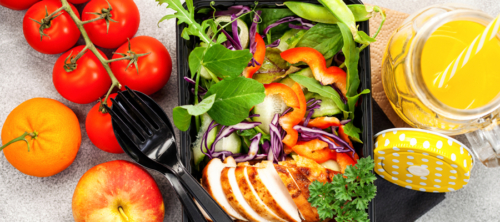Is Eating Only Wholefoods Even Doable?
January 12, 2022

I’ve said it before, and you’ve probably heard it before. The notion is that if you eat for health your diet should be made up predominately of Whole Foods. Natural foods that haven’t been altered.
Whole foods have so many health benefits. Benefits that are so powerful the following is very true:
Food is Thy Medicine.
Why is this true? What are the benefits?
Whole foods are like nature’s medicine cabinet, they contain chemicals, compounds, vitamins, and minerals that promote health.
I could go on and list many of the benefits, however, this article isn’t on the benefits of Whole Foods.
This post is about whether only eating Whole Foods is actually possible and if all processed foods are bad for us?
Is it possible to only eat Whole Foods?
Yes, it would be possible, extremely difficult though. Studies on this subject highlight that for the average person, living in a suburban area, it is surprisingly difficult to create a meal plan based entirely on whole foods.
And this isn’t all bad, there are some genuinely healthy foods that are classed as processed foods.
There are a few categories of processed foods.
1. Minimally Processed (e.g – Milk, Meat, nuts, and seeds)
2. Processed (e.g – Canned, Bagged, and Frozen Foods, cheese, Ham, Yoghurt)
3. Processed Culinary Ingredients (e.g. – Salt, Sugar, Animal Fats, Vegetable Oils & Spreads)
4. Ultra-processed (e.g. Breakfast Cereal, Lollies, Chips, Baked Goods, Soft Drinks, Juices)
The problem lies with the last two categories, in particular, category four; Ultra-processed Foods.
These Ultra-processed foods generally contain lots of sugar, added fats, sodium, and other harmful additives. Chemical additives for flavor, texture, and/or shelf life. They can mess with our natural appetite, hunger, and satiety signals. To add to this they are hyper-palatable, meaning it’s really easy to overeat these ultra-processed foods.
It is true that whole foods that are unprocessed are best for health. It is also true to say it is nearly impossible for the average person to eat this way. The thing for us to understand is that we can access many foods that are minimally processed and still be eating well, eating for good health.
The problem isn’t necessarily processed foods as such, the problem is how processed a food is. Minimally processed foods will be included in most healthy diets.
The serious problem we face, and why there is a recommendation from nutrition specialists to stay away from processed foods is the regular and overconsumption of the Ultra-processed foods that are doing all the damage, leading people down the path of weight gain and ill health.
Share This Story, Choose Your Platform!
Is Eating Only Wholefoods Even Doable?
January 12, 2022

I’ve said it before, and you’ve probably heard it before. The notion is that if you eat for health your diet should be made up predominately of Whole Foods. Natural foods that haven’t been altered.
Whole foods have so many health benefits. Benefits that are so powerful the following is very true:
Food is Thy Medicine.
Why is this true? What are the benefits?
Whole foods are like nature’s medicine cabinet, they contain chemicals, compounds, vitamins, and minerals that promote health.
I could go on and list many of the benefits, however, this article isn’t on the benefits of Whole Foods.
This post is about whether only eating Whole Foods is actually possible and if all processed foods are bad for us?
Is it possible to only eat Whole Foods?
Yes, it would be possible, extremely difficult though. Studies on this subject highlight that for the average person, living in a suburban area, it is surprisingly difficult to create a meal plan based entirely on whole foods.
And this isn’t all bad, there are some genuinely healthy foods that are classed as processed foods.
There are a few categories of processed foods.
1. Minimally Processed (e.g – Milk, Meat, nuts, and seeds)
2. Processed (e.g – Canned, Bagged, and Frozen Foods, cheese, Ham, Yoghurt)
3. Processed Culinary Ingredients (e.g. – Salt, Sugar, Animal Fats, Vegetable Oils & Spreads)
4. Ultra-processed (e.g. Breakfast Cereal, Lollies, Chips, Baked Goods, Soft Drinks, Juices)
The problem lies with the last two categories, in particular, category four; Ultra-processed Foods.
These Ultra-processed foods generally contain lots of sugar, added fats, sodium, and other harmful additives. Chemical additives for flavor, texture, and/or shelf life. They can mess with our natural appetite, hunger, and satiety signals. To add to this they are hyper-palatable, meaning it’s really easy to overeat these ultra-processed foods.
It is true that whole foods that are unprocessed are best for health. It is also true to say it is nearly impossible for the average person to eat this way. The thing for us to understand is that we can access many foods that are minimally processed and still be eating well, eating for good health.
The problem isn’t necessarily processed foods as such, the problem is how processed a food is. Minimally processed foods will be included in most healthy diets.
The serious problem we face, and why there is a recommendation from nutrition specialists to stay away from processed foods is the regular and overconsumption of the Ultra-processed foods that are doing all the damage, leading people down the path of weight gain and ill health.


